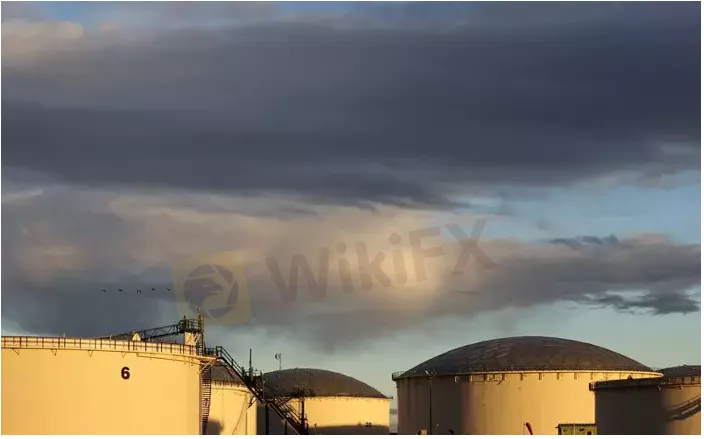简体中文
繁體中文
English
Pусский
日本語
ภาษาไทย
Tiếng Việt
Bahasa Indonesia
Español
हिन्दी
Filippiiniläinen
Français
Deutsch
Português
Türkçe
한국어
العربية
Oil falls on recession jitters, China COVID curbs
Abstract:Oil prices were unsteady on Monday, with Brent trading higher on supply concerns while West Texas Intermediate (WTI) dipped, as traders balanced supply concerns against worries about a recession or China’s COVID-19 curbs hitting demand.

il prices fell around $1 on Monday in volatile trade, reversing some gains from the previous session, as worries about a recession and Chinas COVID-19 curbs hitting demand outweighed ongoing concerns about tight supply.
Brent crude futures fell 82 cents, or 0.8%, to $106.20 at 0314 GMT, after climbing 2.3% on Friday.
U.S. WTI crude futures declined by $1.04, or 1%, to $103.75, paring a 2% gain from Friday.
Trading was thinned by a public holiday in parts of Southeast Asia, including oil trading hub Singapore.
Both contracts posted weekly declines last week as the market was dominated by worries that rising interest rates to curb inflation would spark a recession and dent oil demand.
“Net long positions in WTI crude futures are now at their lowest level since March 2020, when demand collapsed amid the initial outbreak of COVID-19. This is despite ongoing signs of tightness,” ANZ Research analysts said in a note.
Both benchmark contracts traded lower in early trade on Monday then turned positive, then turned back down again.
Data for July 10 on COVID-19 cases in China showed numbers had climbed from the previous day. Concerns remain about the potential for wider lockdowns after a new Omicron subvariant was discovered in Shanghai.
On the supply side, the market remains nervous about plans by Western nations to cap Russian oil prices, with President Vladimir Putin warning further sanctions could lead to “catastrophic” consequences in the global energy market.
Another key factor traders will be watching is maintenance on the Nord Stream 1 pipeline, the biggest single pipeline carrying Russian gas to Germany, due to run from July 11 to 21. Governments, markets and companies are worried the shut-down might be extended due to war in Ukraine.
“The big problem for markets right now – forget COVID and Biden headlines – its going to be whether Nord Stream comes back on again,” said Stephen Innes, managing partner at SPI Asset Management.
If the pipeline does not come back on as scheduled on July 22, that could lead to gas demand destruction in Europe, which would spur an economic slowdown and flow through to weaker oil demand and stagflation, he said.
“Until we get clear of that major risk event well stay in this loop of good and bad in the oil market,” Innes said.
Questions also remain about how long more crude will flow from Kazakhstan via the Caspian Pipeline Consortium (CPC).
Supply has continued so far on the pipeline, which carries about 1% of global oil, even after it was ordered by a Russian court last week to suspend operations.
CPC Blend crude oil exports are set to rise to 5.45 million tonnes for August from 4.86 million tonnes in July, a loading schedule showed.

Disclaimer:
The views in this article only represent the author's personal views, and do not constitute investment advice on this platform. This platform does not guarantee the accuracy, completeness and timeliness of the information in the article, and will not be liable for any loss caused by the use of or reliance on the information in the article.
Read more

XTB Hack 2025: Major Security Breach Exposes Client Accounts
XTB suffers a major hack in 2025, with hackers draining client accounts and sparking urgent security upgrades. Learn how the breach unfolded and what’s next.

XTB Hack 2025: Major Security Breach Exposes Client Accounts
XTB suffers a major hack in 2025, with hackers draining client accounts and sparking urgent security upgrades. Learn how the breach unfolded and what’s next.

Want to Succeed in Forex? Start with the Right Trading System
If you want to trade currencies and make money in the long run, you need a good forex trading system. Many new traders enter the market without a clear plan. Some rely on luck or tips from others. But trading without a system often leads to losses.

Mumbai Police Nabs Black Paper Dollar Conversion Forex Scam Perpetrators: Check Out the Details
The crime branch of the Mumbai Police has nabbed a racket involved in duping people by claiming to convert black paper into dollars. Check this unique 24.7-lakh scam story.
WikiFX Broker
Latest News
US Government Interest Grows in Victory Metals’ Rare Earths Supply
How Are Trade Policies Affecting the Aluminum Market?
RM71,000 Lost in a Share Scheme That Never Existed
Scammed by a Click: He Lost RM300,000 in a Month
Manual vs. Automated Forex Trading: Which One Should You Choose?
Revealing Factors That Help Determine the Gold Price in India
Why Regulatory Compliance Is the Secret Ingredient to Trustworthy Forex Brokers
Pentagon to become largest shareholder in rare earth miner MP Materials; shares surge 40%
Delta shares jump 12% after airline reinstates 2025 profit outlook as CEO says bookings stabilized
Delta shares jump 13% after airline reinstates 2025 profit outlook as CEO says bookings stabilized
Currency Calculator


